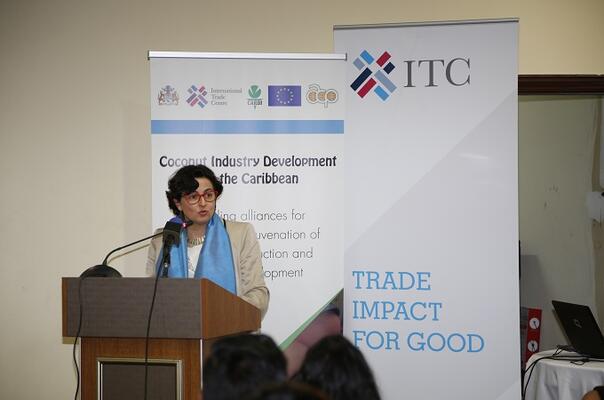
Reviving the Caribbean coconut industry through small businesses
(Georgetown, Guyana) – Representatives of the coconut industry from across the Caribbean are implementing national and regional plans to revive the once thriving sector, by supporting small-scale businesses to export to new markets.
Members of the business community and government – including farmers, processors and government agencies from nine Caribbean countries – met in Georgetown, Guyana, on 21-22 April to discuss market opportunities for coconut products and to share national strategies to develop the sector.
The meeting was organized as part of an International Trade Centre (ITC) project called ‘Coconut Industry Development for the Caribbean’, financed by the European Union.
‘Firms connected to international value chains register high productivity, wages and employment gains,’ said ITC Executive Director Arancha González. ‘Through this project, ITC will help coconut producers in the Caribbean to increase their competitiveness and move to more value-added production while better responding to market demands. ITC is doing this in partnership with the Caribbean Agricultural Research and Development Institute (CARDI) with the aim of helping the Caribbean coconut industry realize its collective market potential.’
Stakeholders focused on taking steps at both the country and regional levels. They discussed findings of the global value-chain analysis on the coconut sector and validated national roadmaps, which communicate the direction for the sector at the country level and highlight steps to be taken at the regional level. They also prioritized product-market combinations to ensure improved export success.
The coconut industry is targeted because of the growing opportunities in regional and global markets for a range of coconut products. The global market for coconut water alone is predicted to reach US$ 4 billion by 2019. The diverse market opportunities are a key area of discussion for industry stakeholders who are keen to capitalize on growing opportunities for value-added coconut products.
According to value chain expert Ajmal Abdulsamad from the Centre of Governance, Globalization and Competitiveness, demand for coconut products across the region is increasing significantly. Despite a general decline of intra-regional trade over the last decade, regional trade for coconuts and coconut products has grown 230% since 2008, he added.
To better organize the coconut sector in each country to realize this market potential, national stakeholder platforms (NSP) were established last year as part of the project. These platforms aim to represent the interests of the coconut sector, facilitate improved communication and coordination between stakeholders, and guide development and implementation of the national coconut sector development strategies.
Raymond Trotz, owner of Phoenix Enterprises Guyana and chairman of Guyana’s NSP, said: ‘The NSP of Guyana is developing a programme of value-chain alliances that addresses the wide range of needs of the coconut sector around the priorities defined by the industry and based on a market-led global value chain analysis.’
The consultation offered an opportunity for representatives of each platform to present, discuss and clarify the details of their respective national strategies, including concrete activities that will be implemented.
Delegates discussed ways the Caribbean can make the most out of growing market opportunities. The industry experienced a period of decline over the past four decades, which resulted in a lack of investment in plantation rejuvenation, enterprise development and support services.
Small-scale coconut producers, processing enterprises and support services in Caribbean countries require assistance to realize market opportunities by revitalizing performance, promoting innovation, improving profitability and complying with international standards. The national strategies that have been developed by stakeholders in each country have been an important step forward to structure this support.
The two-day technical meeting was organized as part of the ‘Coconut Industry Development for the Caribbean’ project implemented by the Geneva-based ITC in partnership with CARDI. The project aims to enhance the competitiveness of small-scale coconut farmers and processors by identifying market opportunities and improving access to advisory services for improved production.
About the International Trade Centre: ITC is the joint agency of the World Trade Organization and the United Nations. ITC assists small and medium-sized enterprises in developing and transition economies to become more competitive in global markets, thereby contributing to sustainable economic development within the frameworks of the Aid-for-Trade agenda and the United Nations’ Global Goals. For more information, visit www.intracen.org. Follow ITC on Twitter: @ITCnews
Contact ITC:
Jarle Hetland
Media Officer
Office of the Executive Director
International Trade Centre
Phone: +41 22 730 0145
Mobile: +41 79 582 91 80
E: Hetland [at] intracen.org (Hetland[at]intracen[dot]org)



